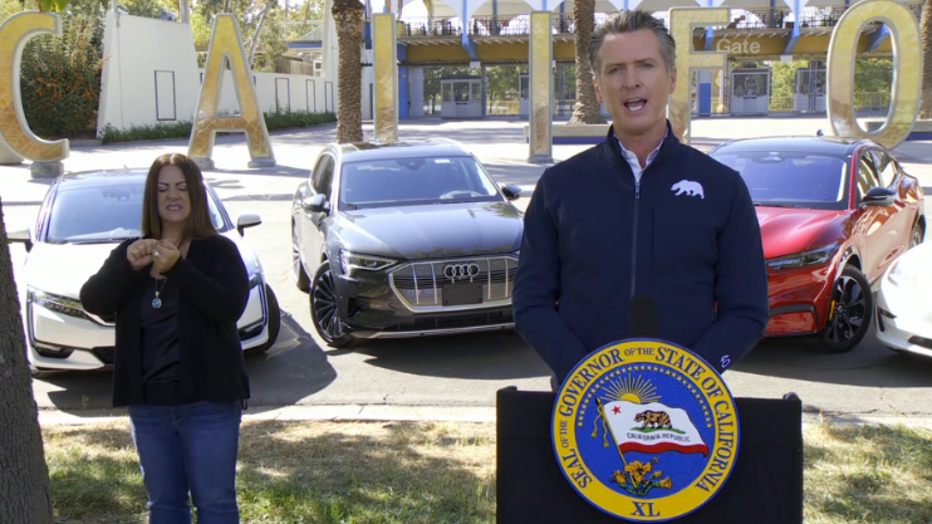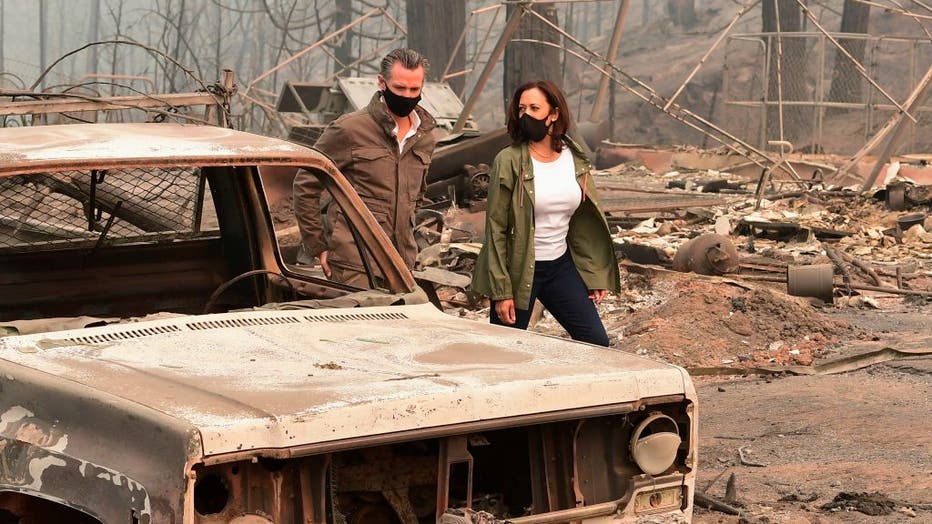California governor signs executive order to ban gas-powered cars and trucks
SACRAMENTO, Calif. - California Gov. Gavin Newsom on Wednesday signed an executive order to ban gas-powered cars and trucks in California by 2035, a move he said would cut greenhouse gas emissions by more than a third.
Plus, Newsom said he is directing the California Air Resources Board to establish regulations that require all new cars and passenger trucks be zero-emission vehicles by 2045 "where feasible."
“This is the most impactful step our state can take to fight climate change,” Newsom said while announcing the order. “For too many decades, we have allowed cars to pollute the air that our children and families breathe. You deserve to have a car that doesn’t give your kids asthma... Cars shouldn’t melt glaciers or raise sea levels threatening our cherished beaches and coastlines.”
California already has rules mandating a certain percentage of new car sales must be electric or zero-emission vehicles.
This rule, if not halted by a court challenge by the oil and gas industry and the Trump administration, would make California the first U.S. state with a plan to phase them out completely.

Gov. Gavin Newsom signs ban on gas-powered cars. Sept. 22, 2020
The transportation sector is responsible for more than half of all of California’s carbon pollution, 80% of smog-forming pollution and 95% of toxic diesel emissions – while Newsom pointed out that communities in the Los Angeles Basin and Central Valley see some of the dirtiest and most toxic air in the country.
The proposed rule would not ban people from owning gas-powered cars or selling them on the used car market. But it would end the sales of all new gasoline-powered passenger cars and trucks in the state of nearly 40 million people. Over time, Newsom's team said this would mean hybrids would be phased out to be replaced by an EV, or electric vehicle, which "would be affordable to everybody."
Download the free FOX 2 KTVU news and weather apps
"There will be price parity" in the years to come, Newsom hypothesized.
At least 15 other countries have already made similar commitments, including Germany, France and Norway.
California is the largest U.S. auto market, accounting for about 11% of all U.S. vehicle sales, and many states choose to adopt its green vehicle mandates. Newsom said that California has 34 companies that make electric vehicles and Tesla this week already moved to make battery prices lower.
Newsom also wants the state legislature to stop issuing new permits by 2024 allowing the use of hydraulic fracturing technology, or fracking, for oil and gas drilling.
While environmentalists cheered, not everyone was thrilled.
Politico noted this gas-powered vehicle ban is likely to face opposition from automakers and Republican leaders in Washington, who have already battled the state over its stricter fuel economy rules.
California Business Roundtable President Rob Lapsley said the "radical step" to ban internal combustion engines "makes no sense" and is a rushed decision, with no guarantee of affordability for many who live in an already-expensive state, Politico reported.
It also is likely to meet opposition from President Donald Trump, who wants to roll back tougher Obama-era auto emissions standards and is battling California to force it to comply. Newsom's team said they felt confident they would win in court if need be.
Others applauded the governor's move, but they did not think the ban was a panacea.
"We still need to reduce vehicle miles traveled, which stems from our abject failure to build sufficiently dense housing in our urban core near jobs and transit and leads to sprawl that contributes to climate change impacts regardless of fuel consumption," the Bay Area Council tweeted.
In a question-and answer period with reporters, Newsom countered that six companies, including Honda, Ford, Toyota and Volvo, have already agreed to this effort. He added he was pursuing an executive order instead of running it through the Legislature because the moment "demands leadership."

US Democratic vice presidential nominee and Senator from California, Kamala Harris and California Governor Gavin Newsom visit the scene of fire-ravaged property from the Creek Fire on September 15, 2020. (Photo by FREDERIC J. BROWN/AFP via Getty Imag
Newsom's announcement comes during Climate Week 2020.
Earlier this month, Newsom stood in the fire-ravaged Oroville State Recreation Area, promising to speed up the state’s efforts to tackle climate change, announcing “this is a climate damn emergency."
Droughts are longer. Fires are more devastating. And temperatures are setting unfortunate records.
“Mother Nature is physics, biology and chemistry. She bats last and she bats 1,000. That’s the reality,” he said at the time. “The debate is over, around climate change. Just come to the state of California. Observe it with your own eyes.”
A United Nations report released in mid-September said carbon emissions declined this year because of coronavirus. But they are starting to creep back up with 2020 still set to close out the warmest five-year period on record. The UN said that global emissions must drop 7.6 percent each year over the next decade to offset the most extreme effects of climate change, including hotter and more destrutive wildfires.
Later on Wednesday afternoon, Newsom will join a virtual panel with 10 U.S. Climate Alliance governors to discuss their states’ respective commitments in support of Paris Agreement targets.
On Thursday, Newsom will host a California Climate Action Day highlighting the state’s leadership, featuring virtual discussions with world, state, tribal and local leaders, business executives and other experts covering a wide array of climate issues.
This story was reported from Oakland, Calif. The Associated Press contributed to this report.

California to end sale of gas-powered cars and trucks
Gov. Newsom today announced that California would no longer allow the sale of cars and trucks that rely only on gasoline for power by 2035.


